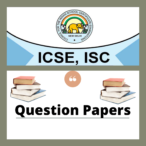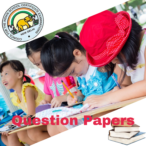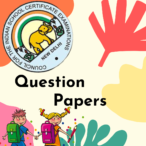ENGLISH LANGUAGE
ENGLISH Paper – 1
![]() Q. 1 (Do not spend more than 30 minutes on this question.)
Q. 1 (Do not spend more than 30 minutes on this question.)
Write a composition (300 – 350 words) on any one of the following:
(a) Write an original short story entitled ‘The Secret’.
(b) ‘A family without pets is an incomplete family’. Express your views either for or against this statement.
(c) Which do you prefer – morning, afternoon, evening or night?
Describe your favourite time of the day. What are the sights, sounds, smells and feelings that you associate with your favourite time of the day? Why do you like this part of the day better than the others.
(d) Have you ever said or done something that changed the life of another person? Give an account of your words or actions that led to this change and describe how the experience made you feel.
(e) Study the picture given below. Write a story or a description or an account of what it suggests to you. Your composition may be about the subject of the picture or you may take suggestions from it; however, there must be a clear connection between the picture and your composition.
![]() Q. 2 (Do not spend more than 20 minutes on this question.)
Q. 2 (Do not spend more than 20 minutes on this question.)
Select any one of the following:
(a) You have changed your school recently. Write a letter to your friend in your old school telling him / her what you like about your new school but also what you miss about your old school.
(b) Some taps in your locality are left open all day resulting in a tremendous waste of water. Write a letter to the Municipal Commissioner of your town / city, complaining about the problem. Suggest ways in which this waste of water can be prevented.
![]() Q. 3 (a) Your school is organising a fete / carnival to raise funds for victims of the recent floods in your State.
Q. 3 (a) Your school is organising a fete / carnival to raise funds for victims of the recent floods in your State.
Write a notice to be put up on the school notice board giving details of the event.
(b) Write an email to the Principal of a neighbouring school, inviting him/ her to send their students to attend the fete / carnival.
![]() Q. 4 Read the following passage carefully and answer the questions that follow: Attending classes inside a railway carriage seemed unusual enough, but the seating arrangements turned out to be unusual, too. At Totto-chan’s previous school each pupil was assigned a specific desk. But here they could sit anywhere they liked at any time.
Q. 4 Read the following passage carefully and answer the questions that follow: Attending classes inside a railway carriage seemed unusual enough, but the seating arrangements turned out to be unusual, too. At Totto-chan’s previous school each pupil was assigned a specific desk. But here they could sit anywhere they liked at any time.
The most unusual thing of all about this school, however, was the lessons themselves.
Schools normally schedule one subject, for example history, during the first period, when everyone in the class just did history; then say, arithmetic in the second period, when you just did arithmetic. But here it was quite 10
different. At the beginning of the first period, the teacher made a list of all the problems and questions in the subjects to be studied that day. Then she would say, “Now, start with any of these you like.”
So, whether you started on history or arithmetic or something else didn’t matter at all. Someone who liked composition might be writing something, while behind you someone who liked chemistry might be boiling something in a flask over an alcohol burner.
This method of teaching enabled the teachers to observe — as the children progressed to higher grades — what they were interested in as well as their way of thinking and their character. It was an ideal way for teachers to really 20 get to know their pupils.
As for the pupils, they loved being able to start with their favourite subject, the fact that they had all day to cope with the subjects they disliked meant they could usually manage them somehow. So, study was mostly independent, with pupils free to go and consult the teacher whenever necessary. Then pupils would be given further exercises to work on alone. It was study in the truest sense of the word, and it meant there were no pupils just sitting inattentively while the teacher talked and explained.
The first-grade pupils hadn’t quite reached the stage of independent study, but even they were allowed to start with any subject they wanted.
Some copied letters of the alphabet, some drew pictures, some read books, and some even did physical exercises.
Just then the boy sitting behind her got up and walked toward the blackboard with his notebook, apparently to consult the teacher. Totto-chan stopped looking around the room and fixed her eyes on his back as he walked. The boy dragged his leg, and his whole body swayed from side to side. Totto Chan wondered at first if he was doing it on purpose, but she soon realized the boy couldn’t help it.
The boy said brightly, “My name’s Yasuaki. What’s yours?”
She was so glad to hear him speak that she replied loudly, “I’m Totto chan.”
Adapted from Totto-chan
(a) Give the meaning of the following words as used in the passage:
One-word answers or short phrases will be accepted.
(i) assigned (line 3)
(ii) ideal (line 19)
(iii) independent (line 24)
(b) Answer the following questions briefly in your own words.
(i) What was unusual about the seating arrangement?
(ii) How did the method of teaching help the teacher?
(iii) Why did the pupils enjoy their lessons at this school?
(iv) What different things did the first-grade pupils do?
(v) Which sentence in the passage tells us that the boy had difficulty in walking like other children?
(c) In not more than 50 words, describe how the children were taught.
![]() Q. 5 (a) Fill in each of the numbered blanks with the correct form of the word given in brackets. Do not copy the passage but write in correct serial order the word or phrase appropriate to the blank space.
Q. 5 (a) Fill in each of the numbered blanks with the correct form of the word given in brackets. Do not copy the passage but write in correct serial order the word or phrase appropriate to the blank space.
Example:
(0) taught
By the time she was three, Matilda had (0) ____________ (teach) herself to read by (1) ____________ (study) newspapers and magazines that (2) ____________ (lie) around the house. At the age of four, she could (3) ____________ (read) fast and well and she naturally began (4) ____________ (hanker) after books. The only book in the whole of this enlightened household was something called Easy Cooking (5) ____________ (belong) to her mother, and when she had read this from cover to cover and had (6) ____________ (learn) all the recipes by heart, she (7) ____________ (decide) she (8) ____________ (want) something more interesting.
(b) Fill in the blanks with appropriate words.
(i) It has been raining __________ two hours.
(ii) He just scraped __________ his examination.
(iii) Mrs. Kapoor was bent __________ attending the meeting.
(iv) She is proud and looks __________ on her colleagues.
(v) Rahul plays football __________ his grandfather.
(vi) The mother was sitting ____________ the sick child all night.
(vii) Monica is leaning ____________ the wall.
(viii) Rosie is very good ____________ art and craft.
(c) Join the following sentences to make one complete sentence without using and, but or so:
(i) Sarah and Tyra are twins. They look exactly alike.
(ii) Rohan does not like to play cricket. He does not like to play hockey either.
(iii) Sania pushed as hard as she could. The door would not open.
(iv) The school bus drove through the gate. The clock was striking eight at that moment.
(d) Rewrite the following sentences according to the instructions given after each. Make other changes that may be necessary, but do not change the meaning of each sentence.
(i) The librarian orders books for the school library every year. (Begin: Books…)
(ii) No one will deny that the children have worked very hard this year. (Begin: Everyone…)
(iii) As soon as the teacher enters, she is greeted by her students. (Begin: No sooner….)
(iv) She is so busy that she finds no time to entertain her friends. (Rewrite using ‘too’)
(v) In spite of the very hot weather, Kevin stepped out to buy some bread. (Begin: Despite.…)
(vi) Sheela will be selected for the competition only if she goes for the auditions. (Begin: Unless….)
(vii)I would rather eat fruit than a lot of unhealthy junk food. (Begin: I prefer….)
(viii)The tree was cut down ruthlessly. (Begin: They…)




